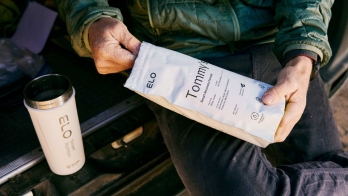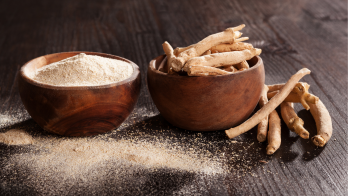The best ergogenic aids for runners according to Registered Dietitians
Looking to improve your running performance? Whether you’re new to running or a seasoned marathoner, ergogenic aids can give you a cutting edge, and help you feel stronger during a run. However, not all are created equal. Here are the best ergogenic aids according to science. (And yes, they’re all legal).

Runners have long relied on ergogenic aids — a fancy term for performance enhancers — to achieve a mental or physical edge while training and competing. But not all ergogenic aids are created equal. From caffeine and carb-loading to illegal substances like anabolic steroids, these performance enhancers vary greatly in both their safety and effectiveness.
In this guide, we'll cover what ergogenic aids are and their benefits for runners, as well as the best, science-backed supplements and nutrition strategies runners can use to enhance their training and running performance. So tie up those laces, and let’s jump into the exciting world of ergogenic aids for runners.
What are ergogenic aids?
Ergogenic aids are tools that athletes use to enhance energy, performance, and recovery, or help prevent injury during intense training. These tools can be mechanical, nutritional, pharmacological, physiological, psychological, or technological and include things like training techniques, nutrition supplements, drugs, and devices [ 1 22
Examples of ergogenic aids
There are an almost limitless number of ergogenic aids that can enhance performance, recovery, and overall training experience. While we typically associate ergogenic aids with things you ingest, like nutritional supplements, they can also take other forms, including specialized gear, technology, and training techniques.
Some examples of ergogenic aids include:
Supplements: Popular ergogenic aid supplements among athletes include protein powder, creatine, caffeine, beetroot, beta-alanine, and energy gels or bars.
Nutrition: Along with eating a balanced, nutrient-rich diet, nutrition strategies like carbohydrate loading and protein timing can help athletes optimize energy levels during exercise and enhance muscle recovery.
Training strategies: Elevation training and speed workouts are two training strategies that can improve oxygen-carrying capacity and endurance in athletes.
Gear: Compression clothing, specialized running shoes, and hydration belts are examples of ergogenic gear that can aid runners.
Technology: Things like GPS watches and fitness trackers can help athletes track their progress, set goals, and analyze performance data.
Benefits of ergogenic aids
Ergogenic aids can offer a multitude of benefits that can help you maximize your potential and achieve your fitness goals. Some benefits of ergogenic aids include:
Improved performance: Whether you're a competitive athlete or a weekend warrior, ergogenic aids can help enhance performance, enabling you to go faster, farther, and with more efficiency.
Reduced fatigue: Some ergogenic aids can also help delay the onset of fatigue during exercise by improving muscle function, oxygen utilization, and energy production. which can help you feel fresher and make it easier to maintain energy levels.
Enhanced recovery: Ergogenic aids can also enhance your body’s recovery by reducing muscle soreness inflammation, and boosting muscle repair. This means you can bounce back faster from intense training sessions and races, allowing you to maintain a consistent training schedule.
Optimized nutrient utilization: Some ergogenic aids focus on optimizing your body's use of essential nutrients like carbohydrates, proteins, and fats. For example, pairing post-workout carbs with protein in a 3:1 carb-to-protein ratio can boost muscle protein synthesis (MPS). This can result in more efficient energy production, better muscle repair, and overall improved nutrient utilization during training and races.
Mental focus: Training and competing is as much a mental game as it is physical. Certain ergogenic aids, like caffeine, can enhance mental focus, helping you stay mentally strong during challenging runs or races.
Ergogenic aid supplements and nutritional strategies for runners
From natural compounds like caffeine that can increase exercise capacity to stimulating muscle protein synthesis with post-run protein, there are a wealth of ways you can elevate your training and get closer to achieving your running goals. Here are some of the best ergogenic aid supplements and nutritional strategies for runners, according to registered dietitians.
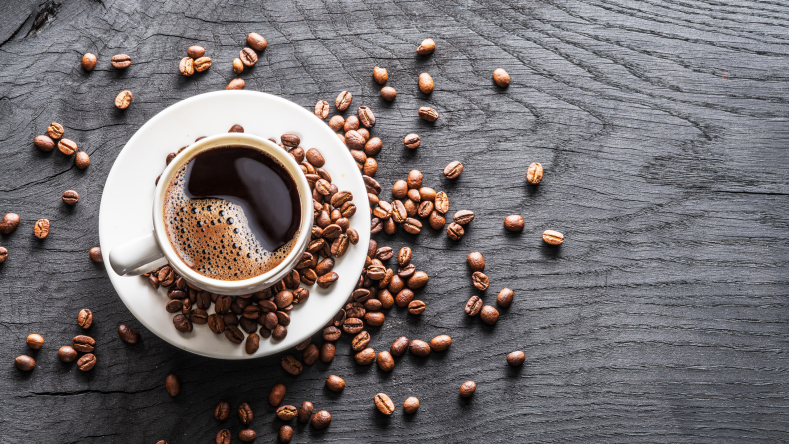
Caffeine
Love your morning coffee? It could be useful for your running performance, too. Found in everything from coffee to sports gels, caffeine has been used by athletes to improve performance for decades. Caffeine stimulates the nervous system by blocking the activity of adenosine, a compound found in cells that has sedative-like properties. Research shows caffeine can improve endurance by 7-9% when combined with carbohydrates, leg power by up to 7%, and shave up to 4.2 seconds off of a 1500m run [ 2 3 4 23
According to board-certified sports dietitian, Leslie Bonci, MPH, RD, CSSD
“Caffeine can improve exercise capacity and spare muscle glycogen,” she says, which “can be useful before and during exercise in combination with carbohydrates.”
Best for
Caffeine can benefit all competitive runners, particularly endurance runners and those engaged in intermittent, long-duration training like track athletes [ 5
Sources
Caffeine is found naturally in coffee, tea, cacao (the main ingredient in chocolate), and various herbal and botanical sources, including guarana and yerba mate. Caffeine is also available in capsule form and is often added to energy drinks, bars, and gels.
Dosing
Caffeine is generally considered ergogenic at doses of 3 to 6 mg/kg [ 6
Studies show limiting caffeine intake to 50mg/day or cutting out caffeine altogether for 2-7 days before a race might maximize its effect [ 7
A growing body of evidence also suggests that the consumption of caffeine with fluid during exercise might extend its benefits for runners [ 4
Good to know
When it comes to using caffeine to enhance performance, the key is figuring out how much your body can tolerate. “Caffeine at high levels can have a diuretic effect and can cause GI distress in some athletes,” says Bonci. To minimize the potential for any extra pre-race jitters and stomach upset on race day, Bonci recommends training with it since caffeine tolerance and sensitivity can vary greatly between individuals.

Carbohydrates
Carbohydrates important fuel source for runners
Why? Carbohydrates are the preferred fuel source for muscles during moderate-to-intense exercise. Increased dietary carbohydrate intake before, during, and after exercise has been shown to enhance exercise performance and recovery for both prolonged and intermittent high-intensity exercise [ 8
Increased dietary carbohydrate intake before, during, and after exercise has been shown to enhance exercise performance and recovery for both prolonged sustained and intermittent high-intensity exercise [
8
].
Increasing carbohydrate intake days and even hours before a race has been shown to increase muscle glycogen (carbohydrate stores) and enhance performance in endurance events, particularly those lasting 90 minutes or more [ 5
After exercise, adequate carbohydrate consumption promotes rapid repletion of liver and muscle glycogen stores to enhance recovery and minimize performance decline in the days that follow [ 8
Best for
All runners, from sprinters to ultra-marathoners, may benefit from carbohydrate consumption as an ergogenic aid.
Sources
Foods like whole grains, vegetables, and fruits are excellent sources of carbohydrates and should make up the majority of dietary carbohydrate intake. Other sources of carbohydrates, including refined sugars, starches, and engineered sports nutrition products (including sports drinks, gels, and chews), can be helpful when glucose or glycogen resynthesis needs are high (and digestive capacity is low), such as during or immediately after an endurance run [ 1
Dosing
Daily needs for endurance. For recreational runners focused on general fitness, a normal diet comprised of 45-55% calories from carbohydrates, 15-20% calories from protein, and 25-35% calories from fat is typically adequate [
1
]. Runners participating in more intense training (2-3 hours/day, 5-6 days/week) should aim to consume 5-8 g carbohydrate/kg/day to maintain liver and muscle glycogen stores [1
].Before a run. For runs lasting 60 minutes or more, athletes should consume 1-4 g carbohydrate/kg 1-4 hours before exercise [
8
]. Light, rapidly absorbed choices like a banana or toast with jam are good options for topping up carbohydrates pre-run. Skip high-fiber and high-fat options, as these can lead to gastrointestinal distress mid-run (and no one has time for that).During a run. For high-intensity races lasting roughly 1 hour, small amounts of carbohydrate, including mouth-rinsing with sugar water, may enhance performance [
9
,10
]. Again, rapidly absorbed sources of carbohydrates like sports drinks, bananas, and gummy bears are preferable here to minimize gastrointestinal distress mid-run. For running events lasting 1-2 ½ hours, athletes should aim to consume 30-60g carbohydrates/hour [10
]. For races lasting more than 2 ½ hours, runners may benefit from higher intakes up to 90 g/hour [10
].After a run. For optimal muscle recovery and glycogen resynthesis, runners should consume at least 1-2 g carbohydrates/kg as part of a post-workout meal. Athletes who experience stomach upset following carbohydrate ingestion post-exercise may benefit from pairing carbohydrates with a small amount of protein (0.2-0.4 g/kg/hr) as well as decreasing carb intake to 0.8 g/kg/hr [
10
].
Here’s more on
why carbs are important
and how they can boost performance.
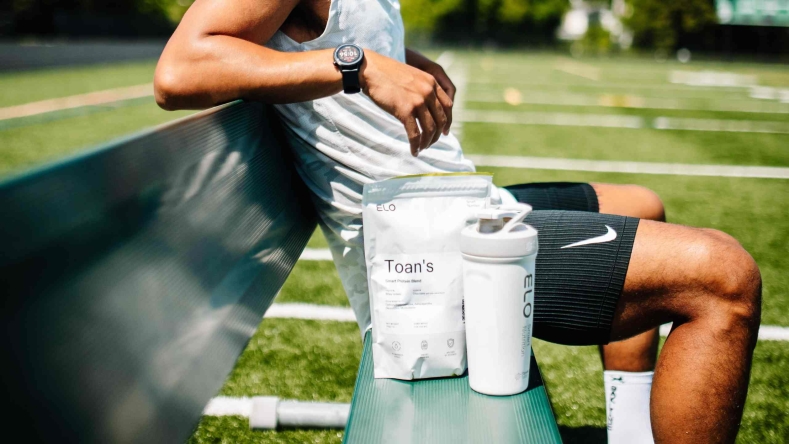
Protein
In addition to carbohydrates, protein 24 25
Best for
Whether you’re a short-distance sprinter or a long run-lover, all runners may benefit from protein consumption as an ergogenic aid.
Sources
Experts recommend runners focus on whole food sources of protein that contain all of the essential amino acids, as these are key to stimulating MPS and recovery [ 25
Foods that contain high-quality protein include eggs, dairy, lean meat, poultry, fish, beans, lentils, peas, soybeans, and tofu. Protein supplements can also help athletes with higher protein needs to achieve an optimal intake of quality protein [ 25
Dosing
Runners need more protein than the average individual because these activities increase metabolic needs and the breakdown of muscle tissue [ 26
While the average individual needs around 0.8-1.2 g of protein/kg of body weight/day, experts say endurance athletes need anywhere from 1.4 to 2 g/kg/day [ 25
To stimulate robust increases in muscle protein synthesis after exercise, runners should aim to consume 20-40 grams of high-quality protein (preferably paired with carbohydrates) within 1 hour of exercising [ 24 25
Good to know
When it comes to protein intake, timing matters tremendously. This is because the body doesn’t store protein like it can store other nutrients and requires essential amino acids to stimulate MPS. For this reason, runners should divide their daily protein intake into 3-4 hour intervals throughout the day and make sure to get at least 20-40 g after every run.
If you want to learn more about the importance of protein for runners, here’s everything you need to know about protein for endurance athletes

Elo Smart Protein, a personalized ergogenic aid
Whether you're chasing a new PR or just want to optimize your post-run regimen, Elo Health
Elo Smart Protein
Learn more about how Elo Smart Protein works
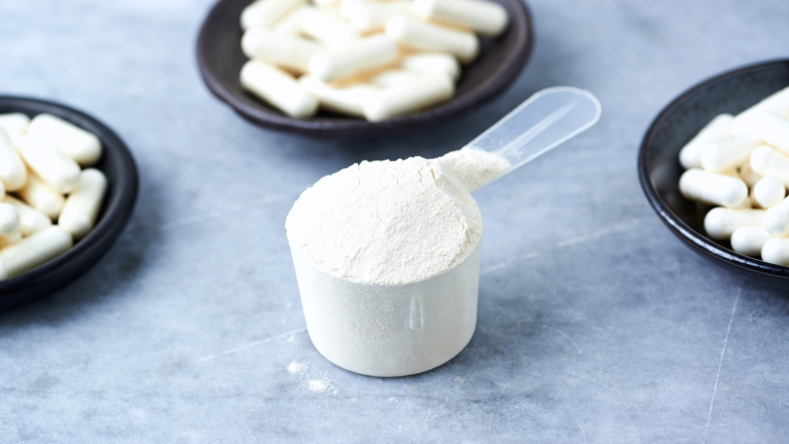
Beta-alanine (ϐ-alanine)
Beta-alanine is an amino acid and a precursor to carnosine, a compound found in muscles that buffers lactic acid build-up in muscles. Lactic acid accumulates in muscles during moderate-to-high-intensity activity and leads to reduced force and fatigue (as well as nausea).
Some research shows that beta-alanine supplementation can increase muscle carnosine levels, reduce lactic acid build-up, and thus improve certain aspects of performance, including anaerobic threshold, time to exhaustion, and muscle fatigue, particularly in older athletes [ 1
Best for
Sprinters running short distances at max, or near-maximum speed [ 1
Sources
Beta-alanine is found in relatively low amounts in animal-based foods like meat, poultry, and fish. For runners seeking ergogenic benefits, beta-alanine is also available as a powder and in capsules as well.
Dosing
For ergogenic benefits, the International Society of Sports Nutrition recommends a daily intake of 4-6g/day (taken in doses of 2 grams or less) for up to 8 weeks. This dosage of beta-alanine has been shown to significantly increase muscle carnosine after 4 weeks of supplementation [ 1
Good to know
Evidence suggests that beta-alanine supplementation, even at the recommended dose, may leave you feeling a bit prickly. “Some athletes experience side effects, tingling in fingers and toes, and it is expensive,” says Bonci. This tingling, prickling, or burning sensation, also known as paresthesia, typically occurs in the upper body and can last anywhere from 60-90 minutes. Though uncomfortable, it is not a harmful reaction and can often be avoided by taking sustained-release beta-alanine supplements and/or dividing doses throughout the day [ 1

Beetroot (Nitrates)
Beet-stained hands may be worth it for runners. Beets are packed with nitrates and raise nitric oxide levels in the body. Nitric oxide is thought to enhance athletic performance in several ways including:
Reducing blood pressure and increasing blood flow to working muscles.
Acting as a signaling molecule to ensure adequate oxygen uptake by muscle tissue [
1
,16
].Research shows the combined effects of beetroot/nitrogen supplementation may improve aerobic exercise performance [
1
].
Chrissy Carroll, RD, and USAT Level I Triathlon Coach at Snacking in Sneakers
Best for
Nitrate supplementation seems to have the most ergogenic effect for exercise lasting 5-30 minutes, so short- to mid-distance runners will likely reap the most benefit. Limited evidence exists for performance improvement over longer durations [ 17
Sources
Nitrates are not sold as isolated dietary supplements due to concerns and regulations around ingesting high amounts of sodium nitrate, a food preservative. Instead, they are typically supplemented by consuming nitrate-rich foods, like beets and dark leafy greens [ 18
Nitrate-rich foods include:
Red beets, celery, and arugula (approximately 250 mg nitrate/100g)
Raw spinach (approximately 900 mg nitrate/cup)
Beet juice (approximately 250 mg nitrate/cup)
Beetroot is also available in concentrated powders and juice “shots” which vary in potency and dosage.
Dosing
The International Society of Sports Nutrition recommends athletes consume 300-600 mg nitrate/day (or 0.1 mmol/kg/day), either in the form of beetroot juice or sodium nitrate, 2-3 hours before exercise, for ergogenic benefits [ 1
Good to know
Consuming red beets or beetroot juice as an ergogenic aid can cause red urine and stools [ 5
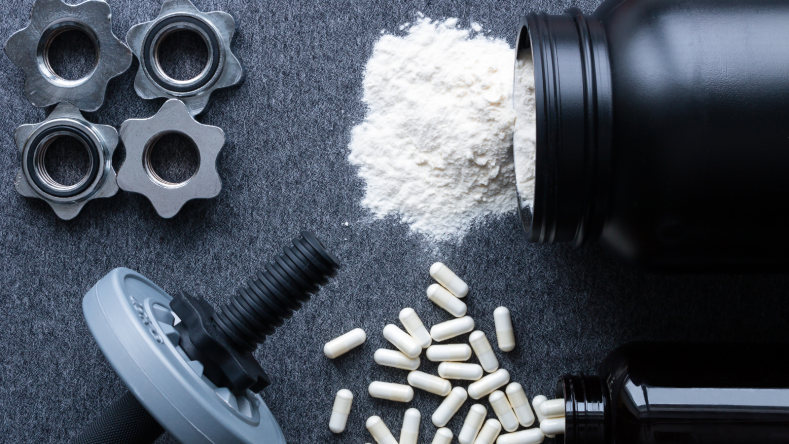
Creatine (Creatine monohydrate)
One of the most popular sports dietary supplements on the market, creatine
Best for
Sprinters running short distances at max, or near-maximum speed.
Creatine supplementation has been shown to enhance performance during short bursts of high-intensity activity like sprinting, but it is of little value for mid-to-long-distance runners [ 1 1
Some research suggests that creatine supplementation paired with high carbohydrate intake post-run may enhance muscle glycogen stores, making it potentially beneficial for distance runners [ 11
Sources
Creatine is found naturally in food sources such as milk, red and white meat, and lesser amounts in fish and mollusks.
Creatine must be supplemented as food sources alone contain inadequate amounts for ergogenic benefits. Creatine monohydrate is the most common, affordable, and effective form of creatine on the market and typically comes in powder form that readily dissolves in liquids [ 12
Dosing
Creatine supplementation begins with a loading period before entering a maintenance phase.
The recommended loading dose is 0.3 g creatine/kg/day (divided into 4 equal doses throughout the day) for 5-7 days [ 13 12 13
Good to know
Weight gain and water retention are common during the initial phases of creatine supplementation [ 13 12
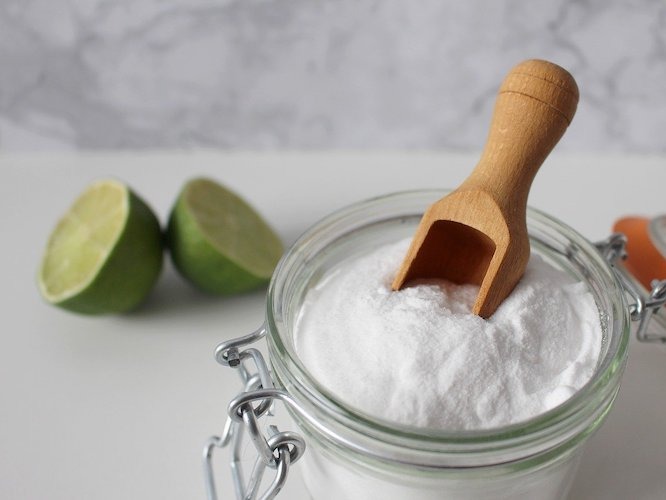
Sodium Bicarbonate
Recognize this one? Often used in baking and household cleaning, sodium bicarbonate (aka baking soda) may also improve athletic performance in runners.
Known as bicarbonate loading, ingesting baking soda as an ergogenic aid can be an effective way to buffer the buildup of lactic acid in muscles during high-intensity exercise (typically lasting 1-3 minutes) [ 1
Best for
Short-distance runners that feel the effects of lactic acid build-up [ 14
Sources
Sodium bicarbonate supplements are available in capsules, though store-bought baking soda is equally effective and less expensive [ 14
Dosing
For ergogenic benefits, sodium bicarbonate should be supplemented in a single dose of 0.3 g sodium bicarbonate/kg, 60-90 minutes before exercise [ 1
Good to know
Gastrointestinal distress is a common side effect of consuming too much sodium bicarbonate too quickly, and supplementation should be approached cautiously at first.
Also, it’s important to know that sodium bicarbonate contains a lot of sodium — 1,259 mg/teaspoon — and can cause temporary fluid retention when consumed in high doses. High sodium intake over time is also associated with high blood pressure, heart attack, and stroke, and studies have not evaluated the safety of long-term use of sodium bicarbonate as an ergogenic aid [ 5
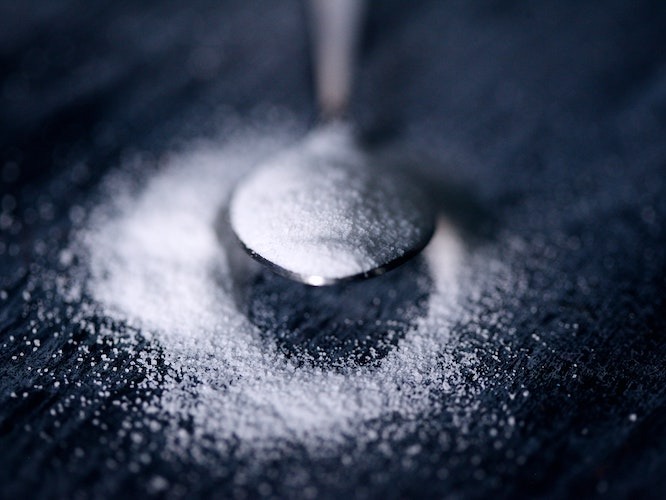
Sodium Phosphate
Sodium phosphate is a supplement and compound composed of salt and phosphate. Sodium phosphate is thought to improve oxygen transport and buffer the effect of lactic acid buildup, both of which impact aerobic and anaerobic capacity, power output, and cardiovascular response [ 1
Best for
All runners may benefit from sodium phosphate supplementation due to the potential impact on both aerobic and anaerobic performance.
Sources
Sodium phosphate is found in common food sources like red meat, dairy, fish, and cereal; however, oral supplementation (capsule form) is necessary to produce ergogenic benefits.
Dosing
For use as an ergogenic aid, the recommended dosage for sodium phosphate is 3–5 g/day for 3-6 days [ 15
Good to know
The majority of studies evaluating the ergogenic potential of sodium phosphate have been conducted in men, and the studies including females have returned varying results [ 1
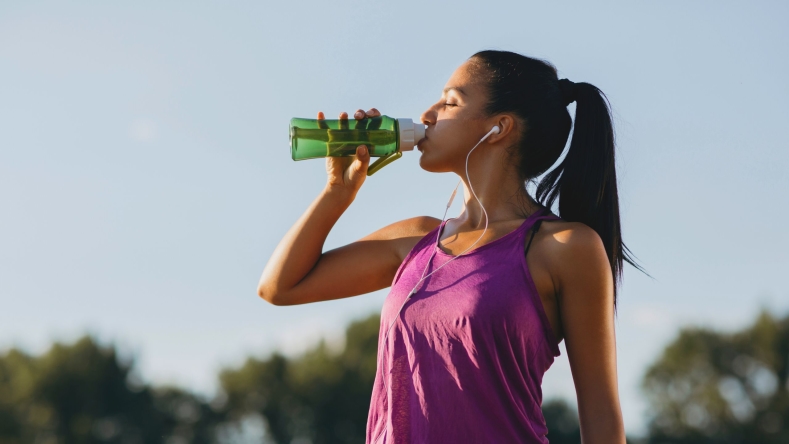
Water & sports drinks
Water and sports drinks 1
Sports drinks are typically used as ergogenic aids during and after longer endurance activities and contain a combination of water for hydration, carbohydrate (glucose), which provides muscles with quick-burning fuel, and electrolytes to offset those lost in sweat.
Best for
All runners and athletes can benefit from proper hydration. For long-distance runners running for one hour or more, sports drinks can offer added benefits by providing carbohydrates for sustained energy and replenishing lost electrolytes.
Sources
When it comes to hydration, filtered tap water, and bottled water are equally effective, though filtered tap water is significantly less expensive.
Dissolvable electrolyte tablets and powders may be beneficial if you sweat heavily during exercise or are exercising in hot and humid conditions but do not need the additional carbohydrates from a traditional sports drink.
Sports drinks are available in ready-to-drink bottles, as well as tablets and powders that are easily dissolved in water.
Dosing
Before a run. Athletes should aim to consume 5-10 mL fluid/kg (preferably water) 2-4 hours before exercise, to achieve urine output lemonade color or lighter [
9
].During a run. For runs lasting less than one hour, small amounts of water, as needed, are typically adequate to sustain optimal performance during the event. For runs lasting one hour or more, runners should aim to consume 0.4-0.8 L (13 ½ to 27 oz) of fluid from water and/or sports drinks per hour, though individual needs and tolerance vary [
9
]. For prolonged runs lasting two hours or more, electrolyte-containing fluids like sports drinks should be consumed to keep runners hydrated and replace sodium lost in sweat.After a run. Since most athletes finish exercising with a fluid deficit, many runners benefit from consuming enough water (and sodium, if needed) to achieve urine output that is lemonade or lighter. Rehydrating at a modest rate will help retain fluids ingested and minimize urinary losses of both fluid and electrolytes [
9
].
The International Society of Sports Nutrition also recommends athletes consume 12-16 oz (0.35-0.47 L) every 10-15 minutes of intense exercise in hot conditions [
1
].
Good to know
Sports gels and bars have become increasingly popular among athletes. While the carbohydrates and electrolytes they contain offer similar ergogenic benefits as those found in sports drinks, these products do not provide fluids and should be consumed with water for optimal digestion, absorption, and hydration.
Summary
From enhancing performance and delaying fatigue to promoting efficient recovery and optimizing nutrient utilization, ergogenic aids are essential for runners aiming to reach their peak potential. From a nutrition standpoint, ergogenic aids like caffeine, carbohydrates, protein, beta-alanine, beetroot, creatine, sodium bicarbonate, sodium phosphate, water, and electrolytes are some of the most effective, safe, and science-backed. With Elo Health's personalized ergogenic aid, Elo Smart Protein, you can combine several of these into one convenient recovery beverage. When it comes to ergogenic aids, experimenting in training is important to develop a routine that works best for you. As always, check with your doctor before starting supplements if you have a pre-existing condition.
Disclaimer: The text, images, videos, and other media on this page are provided for informational purposes only and are not intended to treat, diagnose or replace personalized medical care.
Key takeaways
Ergogenic aids come in various forms, including supplements, gear, technology, and training strategies.
The best ergogenic aid supplements and nutrition strategies for runners include caffeine, carbohydrates, protein, beta-alanine, beetroot, creatine, sodium bicarbonate, sodium phosphate, and hydration strategies.
Elo Smart Recovery offers personalized protein blends with ergogenic boosts to optimize post-run recovery.
Each ergogenic aid has unique benefits and considerations, making it essential for runners to choose the most suitable options based on their training goals and individual needs.
References
Kerksick, C. M., Wilborn, C. D., Roberts, M. D., Smith-Ryan, A., Kleiner, S. M., Jäger, R., Collins, R., Cooke, M., Davis, J. N., Galvan, E., Greenwood, M., Lowery, L. M., Wildman, R., Antonio, J., & Kreider, R. B. (2018). ISSN exercise & sports nutrition review update: research & recommendations. Journal of the International Society of Sports Nutrition, 15(1), 38.
https://doi.org/10.1186/s12970-018-0242-y
Ivy, J. L., Costill, D. L., Fink, W. J., & Lower, R. W. (1979). Influence of caffeine and carbohydrate feedings on endurance performance. Medicine and science in sports, 11(1), 6–11.
https://pubmed.ncbi.nlm.nih.gov/481158/
Warren, G. L., Park, N. D., Maresca, R. D., McKibans, K. I., & Millard-Stafford, M. L. (2010). Effect of caffeine ingestion on muscular strength and endurance: a meta-analysis. Medicine and science in sports and exercise, 42(7), 1375–1387.
https://doi.org/10.1249/MSS.0b013e3181cabbd8
Wiles, J. D., Bird, S. R., Hopkins, J., & Riley, M. (1992). Effect of caffeinated coffee on running speed, respiratory factors, blood lactate and perceived exertion during 1500-m treadmill running. British journal of sports medicine, 26(2), 116–120.
https://doi.org/10.1136/bjsm.26.2.116
Office of Dietary Supplements - Dietary Supplements for Exercise and Athletic Performance. (2019, October 17). National Institutes of Health.
https://ods.od.nih.gov/factsheets/ExerciseAndAthleticPerformance-HealthProfessional/
Pickering, C., & Kiely, J. (2019). Are low doses of caffeine as ergogenic as higher doses? A critical review highlighting the need for comparison with current best practice in caffeine research. Nutrition (Burbank, Los Angeles County, Calif.), 67-68, 110535.
https://doi.org/10.1016/j.nut.2019.06.016
Ganio, M. S., Klau, J. F., Casa, D. J., Armstrong, L. E., & Maresh, C. M. (2009). Effect of caffeine on sport-specific endurance performance: a systematic review. Journal of strength and conditioning research, 23(1), 315–324.
https://doi.org/10.1519/JSC.0b013e31818b979a
Hargreaves, M., Hawley, J. A., & Jeukendrup, A. (2004). Pre-exercise carbohydrate and fat ingestion: effects on metabolism and performance. Journal of sports sciences, 22(1), 31–38.
https://doi.org/10.1080/0264041031000140536
Thomas, D. T., Erdman, K. A., & Burke, L. M. (2016). Position of the Academy of Nutrition and Dietetics, Dietitians of Canada, and the American College of Sports Medicine: Nutrition and Athletic Performance. Journal of the Academy of Nutrition and Dietetics, 116(3), 501–528.
https://doi.org/10.1016/j.jand.2015.12.006
Burke, L. M., Hawley, J. A., Wong, S. H., & Jeukendrup, A. E. (2011). Carbohydrates for training and competition. Journal of sports sciences, 29 Suppl 1, S17–S27.
https://doi.org/10.1080/02640414.2011.585473
Op 't Eijnde, B., Ursø, B., Richter, E. A., Greenhaff, P. L., & Hespel, P. (2001). Effect of oral creatine supplementation on human muscle GLUT4 protein content after immobilization. Diabetes, 50(1), 18–23.
https://doi.org/10.2337/diabetes.50.1.18
Patel, K. (2020, May 8). Creatine. Examine.Com.
https://examine.com/supplements/creatine/
Cooper, R., Naclerio, F., Allgrove, J., & Jimenez, A. (2012). Creatine supplementation with specific view to exercise/sports performance: an update. Journal of the International Society of Sports Nutrition, 9(1), 33.
https://doi.org/10.1186/1550-2783-9-33
Patel, K. (2020, May 8). Sodium Bicarbonate. Examine.Com.
https://examine.com/supplements/sodium-bicarbonate/
Buck, C. L., Wallman, K. E., Dawson, B., & Guelfi, K. J. (2013). Sodium phosphate as an ergogenic aid. Sports medicine (Auckland, N.Z.), 43(6), 425–435.
https://doi.org/10.1007/s40279-013-0042-0
Patel, K. (2020, February 24). Nitrate. Examine.Com.
https://examine.com/supplements/nitrate/
Domínguez, R., Cuenca, E., Maté-Muñoz, J. L., García-Fernández, P., Serra-Paya, N., Estevan, M. C., Herreros, P. V., & Garnacho-Castaño, M. V. (2017). Effects of Beetroot Juice Supplementation on Cardiorespiratory Endurance in Athletes. A Systematic Review. Nutrients, 9(1), 43.
https://doi.org/10.3390/nu9010043
Jones A. M. (2014). Dietary nitrate supplementation and exercise performance. Sports medicine (Auckland, N.Z.), 44 Suppl 1(Suppl 1), S35–S45.
https://doi.org/10.1007/s40279-014-0149-y
Hull, M. (2020, November 5). Nitric Oxide. Examine.Com.
https://examine.com/topics/nitric-oxide/
Hord, N. G., Tang, Y., & Bryan, N. S. (2009). Food sources of nitrates and nitrites: the physiologic context for potential health benefits. The American Journal of Clinical Nutrition, 90(1), 1–10.
https://doi.org/10.3945/ajcn.2008.27131
Reap the Benefits of Beetroot Juice. (2012, February). Today’s Dietitian.
https://www.todaysdietitian.com/newarchives/020612p48.shtml
Marcus, J. B. (2013). Culinary Nutrition: The science and practice of healthy cooking. http://ci.nii.ac.jp/ncid/BB17572280
Cappelletti, S., Piacentino, D., Sani, G., & Aromatario, M. (2015). Caffeine: cognitive and physical performance enhancer or psychoactive drug?. Current neuropharmacology, 13(1), 71–88.
https://doi.org/10.2174/1570159X13666141210215655
Kerksick, C. M., Arent, S. M., Schoenfeld, B. J., Stout, J. R., Campbell, B., Wilborn, C. D., Taylor, L., Kalman, D., Smith-Ryan, A. E., Kreider, R. B., Willoughby, D. S., Arciero, P. J., VanDusseldorp, T. A., Ormsbee, M. J., Wildman, R., Greenwood, M., Ziegenfuss, T. N., Aragon, A. A., & Antonio, J. (2017b). International society of sports nutrition position stand: nutrient timing. Journal of the International Society of Sports Nutrition, 14(1).
https://doi.org/10.1186/s12970-017-0189-4
Jäger, R., Kerksick, C. M., Campbell, B., Cribb, P. J., Wells, S., Skwiat, T. M., Purpura, M., Ziegenfuss, T. N., Ferrando, A. A., Arent, S. M., Smith-Ryan, A. E., Stout, J. R., Arciero, P. J., Ormsbee, M. J., Taylor, L., Wilborn, C. D., Kalman, D., Kreider, R. B., Willoughby, D. S., . . . Antonio, J. (2007). International Society of Sports Nutrition position stand: protein and exercise. Journal of the International Society of Sports Nutrition, 4(1).
https://doi.org/10.1186/1550-2783-4-8
Kato, H., Suzuki, K., Bannai, M., & Moore, D. R. (2016). Protein Requirements Are Elevated in Endurance Athletes after Exercise as Determined by the Indicator Amino Acid Oxidation Method. PloS one, 11(6), e0157406. https://doi.org/10.1371/journal.pone.0157406



